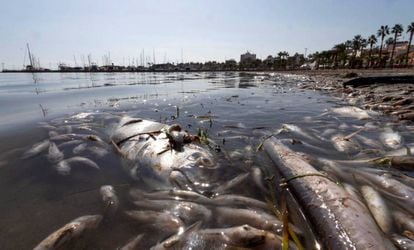The race to make Spain’s Mar Menor a legal person
A citizen-driven bill that aims to protect the largest saltwater lagoon in Europe needs to secure 276,000 more signatures before October 28 if is to be considered by parliament
/cloudfront-eu-central-1.images.arcpublishing.com/prisa/DEZZZHSZFJHQBPUDG33DUQZH2Q.jpg)

Collecting 500,000 signatures in Spain to get parliament to debate a citizen-driven bill is a difficult challenge. Trying to do so in the midst of the coronavirus pandemic is almost impossible. But if the promoters of the legislative initiative launched to defend Murcia’s Mar Menor were faint-hearted, they would not be taking on such a difficult task – the approval of a law that will grant Mar Menor legal personhood. This would allow the rights of the natural space to be defended in court, as though it were a person or business.
Nine months after the clock started ticking on the deadline for obtaining half a million signatures, this peculiar proposal has gathered just over 224,000 signatures. Its proponents now have an extension of just three months to obtain another 276,000 signatures before October 28.
“It is difficult, because digital signatures don’t count,” says Rocío García Martínez, 34, an engineering student and one of the project’s coordinators. “They all have to be in-person, but if we get them, we will be pioneers in Europe, because the Mar Menor will be the first natural area with legal personhood on the continent. I was born here. I’m from Mar de Cristal and I have always lived next to the Mar Menor. When I was a little girl, I used to sail and I could see down to the bottom; the algae and the fish. Now the water is green and brown and you can’t see anything. I decided to get involved in defending the lagoon when I saw the beach full of dead fish in 2019.”

Despite being a unique ecosystem, the Mar Menor has suffered serious deterioration in recent decades, mainly due to excessive urban development and the run-off of nitrates from agriculture. In 2019, the situation became so bad that thousands of fish and other marine life washed up dead on the shores due to the lack of oxygen.
Given the ineffectiveness of the current legal framework to preserve Europe’s largest saltwater lagoon, Teresa Vicente, a professor of philosophy of law, instigated the initiative to grant legal personhood to the Mar Menor, based on precedents such as the Atrato River in Colombia or the Whanganui River in New Zealand. In September 2020, the board of Spain’s Congress of Deputies approved the initiative, which is the first step in the process. But parliament will not debate the bill unless the 500,000 authenticated signatures stipulated by Spanish law are obtained.
The clock started on October 28, 2020, after the initiative was validated by the Central Electoral Board, but when the coordinators were all set to go out to gather signatures, they came up against the pandemic, which saw the introduction of strict restrictions on movement. García Martínez remembers with despair how the weeks went by without being able to take action. “It was brutal,” she says. “We didn’t receive the forms to collect signatures and then there were the local lockdowns, so we couldn’t move.”
But everything began to change a few months ago. The pandemic is still posing obstacles but they have more than 2,000 volunteers drumming up support. There are signature collection points in supermarkets, hairdressers, clinics, hotels and stores and even in vaccination centers. As García Martínez says, there are not only volunteers in Murcia, but also in about 20 cities across Spain and even outside the country. “There are people collecting signatures in the Czech Republic, Finland, Germany, France and, recently, in Sweden,” she says. “They are Spaniards who go to the embassies and to where they can find communities of Spaniards.” In the last few days, she has received calls from 30 people offering to help. “In La Manga on the Mar Menor, there are people who collect signatures going door to door,” she says.
Under Spanish law, citizen-driven bills need to collect 500,000 signatures within nine months – a deadline for the initiative that passed on July 28. But the Central Electoral Board granted an extension of three more months due to the restrictions caused by the pandemic, giving the activists until October 28. In spite of the current strong pace, the coordinators are aware they have very little time left. They believe they have little more than two months to collect more signatures than they did in the last nine months, as they will have to allow time to collect those scattered across Europe.

Tere Conesa, another of the coordinators who belongs to the citizens’ movement, says that there are days the initiative keeps her up until 3am. Although she lives in Molina de Segura, this 59-year-old from Murcia says that she has been going to the Mar Menor since she was a child as her parents used to take her to Los Alcázares. “Seahorses abounded and it was an idyllic spot,” she says. “Now I see it and I feel a tremendous sadness; there are already places that smell bad. What has been done so far with the signatures has required a lot of effort, but we need more help, we need more volunteers.”
Not everyone is in favor. There are people living in Murcia who are against the initiative; they believe it may harm the agriculture sector, which is blamed for contaminating the lagoon with nitrates. “Sometimes we get insulted and people say hurtful things,” says Conesa. “It makes us very sad that there are people from Murcia who do not want to sign while there are foreigners who spend the summer here who want to know why they are not allowed to support the initiative [the law states that only signatures of Spanish citizens of legal age with a national identity number, registered on the electoral lists are valid]. There are people who tell us we are politicizing the issue, but it is not so; the Mar Menor needs us all.”
The text of the bill proposed by the initiative seeks recognition that the Mar Menor’s ecosystem has the right to protection, conservation, maintenance and, where appropriate, restoration by governments and locals. It proposes that it has the right to exist as an ecosystem and to evolve naturally, which includes all the natural characteristics of the water, the communities of organisms, the soil and the terrestrial and aquatic subsystems that form part of the Mar Menor lagoon and its basin.
It also proposes that the representation and governance of the lagoon be in the hands of the following authorities: “A guardianship and legal representation of the lagoon, to be exercised through a representative of the public administrations involved in this area and a public representative from the local municipalities; a monitoring committee; and a scientific committee, which will assist with the guardianship and the commission, and which will join an independent commission of scientists and experts, universities and research centers on a regional, national and international level.”
The initiative’s website, ilpmarmenor.org, indicates that there are now 400 points throughout the country where the public can sign.
English version by Heather Galloway.
/cloudfront-eu-central-1.images.arcpublishing.com/prisa/5AHAM7CDOAUL6HOWJTTPM5ETQQ.jpg)
/cloudfront-eu-central-1.images.arcpublishing.com/prisa/IO6342HZJ5C6PDTCE36W5BP3VM.jpg)










































